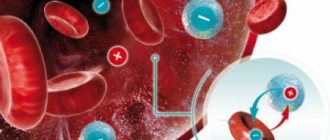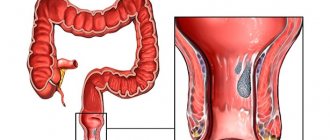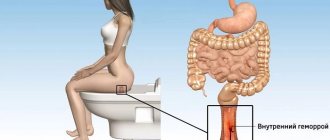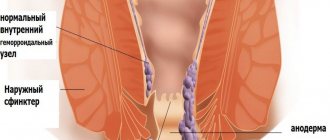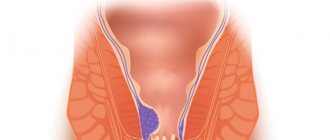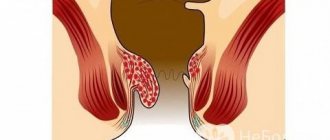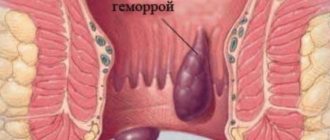Why hemorrhoids do not go away for a long time, what to do
What to do if hemorrhoids do not go away for a very long time, despite all the treatment measures taken? Many patients ask about this, so it’s worth understanding the situation in more detail. To understand why it happened, you need to look at the root of the problem. The thing is that the mechanism of development of this pathology is such that the symptoms of the disease that appear once will accompany a person throughout his life with periods of attenuation and exacerbation of pain. The following reasons contribute to this:
- Weakened walls of blood vessels cannot restore elasticity and tone;
- Blood flow in damaged vessels is significantly slowed down, which constantly causes blood stagnation;
- Hemorrhoidal veins gradually stretch more and more, provoking the development of new nodes.
The severity of hemorrhoid symptoms is individual for each patient. Some people experience virtually no negative sensations, since their inflamed nodes are small and located inside the anal canal, while others suffer from acute pain due to severely dilated veins that have come out and are pinched by the sphincter. For some, the period of remission can last for years, while others live without pain for no more than a month. But the disease never goes away completely. If you make even a small error in preventive therapy, literally in a week, or at best 1-2 months, a relapse of the disease may occur. This gives the feeling that hemorrhoids are not going away.
The main factor in the development of this disease is high pressure in the abdominal cavity. It is provoked by excess weight, prolonged sitting, and heavy lifting. Therefore, in order to successfully get rid of prolapsed nodes, in addition to drug treatment, it is necessary to eliminate the root causes that provoke the development of pathology. Only in this case the patient will not have a reason to complain that hemorrhoids do not go away for a long time and ask what to do in such a situation.
Reasons for the development of long-term hemorrhoids
In both men and women, the causes of long-term hemorrhoidal inflammation are:
- insufficient blood circulation in blood vessels;
- damage to the walls of blood vessels;
- weakened state of blood vessels, loss of elasticity;
- stretching of hemorrhoidal veins;
- formation of nodules in the anal area.
Each patient has a different severity of symptoms. If one person does not feel discomfort with hemorrhoids, and remission lasts for many years, then in another person, from the first days the disease is accompanied by manifestations:
- prolapse of nodes in case of muscle tension;
- the appearance of lumps and protruding hemorrhoids in the anus;
- pain, itching and burning, redness;
- the appearance of mucus from the anus, bleeding.
Hemorrhoids can accompany a person throughout his life. If hemorrhoids do not go away, the first thing to do is visit a doctor.
Compliance with preventive measures is an equally important rule. The greater the pressure on the abdominal cavity, the higher the stage of the disease.
At the first stage, hemorrhoids may fall out in case of strong tension in the anal muscles, and in severe forms they can appear even during leisurely walking or doing household chores.
It is important not to delay going to the doctor. Treatment should be started earlier, the greater the chance of preventing the disease from progressing to a more severe stage.
If the disease recurs after 2 or 3 months, this causes it to be chronic.
Causes of prolonged course of the disease
If hemorrhoids do not go away within 2 weeks, hemorrhoids and lumps do not disappear, remain swollen, dense and painful, we can conclude that the disease takes a protracted course and does not go into remission.
The reason that the disease does not resolve, but continues to torment the patient, may be:
- failure to seek medical help in a timely manner, self-medication and abuse of folk methods and home remedies;
- errors in nutrition during an exacerbation of the disease: eating food that provokes constipation;
- violation of the treatment regimen recommended by the doctor;
- non-compliance with the work and rest schedule;
- heavy load on the lower extremities: work on your feet, heavy lifting, abuse of physical activity, exhausting workouts;
- sedentary, sedentary lifestyle;
- alcohol abuse, smoking;
- inadequate treatment of the disease.
Late visit to the doctor, non-compliance with the prescribed treatment regimen, violation of diet and physical activity are some of the common reasons why hemorrhoids do not go away for a month or more.
If the patient takes medications according to the regimen prescribed by the doctor, but does not follow a diet, eats food that causes constipation (chocolate, smoked meats, refined foods), then the hemorrhoid healing process will not occur. Every time you defecate, hard feces will injure external and internal hemorrhoids and cause inflammation or provoke complications.
Too much physical stress on the body and lower extremities (men often “sin” with it when playing sports), as well as physical inactivity, are harmful to varicose veins of the rectum: stagnation of blood in the venous plexuses or excess pressure on the walls of the veins leads to the fact that the process recovery is delayed.
Development of complications with hemorrhoids
A late visit to the doctor, a not too responsible attitude towards the disease, and neglect of diet during exacerbation of hemorrhoids can not only delay treatment, but also provoke the development of complications.
Negative consequences and complications of the disease include thrombosis and strangulation of hemorrhoidal cones, anal fissures.
The development of complications can be suspected based on the patient’s deteriorating well-being and the following signs:
- increasing pain;
- The patient's inflamed area begins to hurt more strongly, the pain intensifies after defecation, when sitting, in a standing position;
- the appearance of blood in the stool;
- when cracks form during the act of defecation, scarlet blood is released in the form of drops or stripes. This symptom often frightens patients and is the reason for visiting a doctor;
- increase in the volume of nodes.
Patients note swelling of the nodes, their cyanosis, or the appearance of hemorrhagic contents in them. Varicose veins of the rectum become dense, swollen, cannot be reduced, and touching them causes severe pain.
Complications of hemorrhoids often become indications for surgical treatment.
Large hemorrhoids at stages 3-4
If at the initial stage of development of the disease the bumps are small in size, then at later stages it is difficult to turn a blind eye to the inflammation due to an increase in the number of unpleasant symptoms. Very large hemorrhoids:
- block the anus,
- make defecation difficult, which is accompanied by bleeding and severe pain,
- cause enormous discomfort and pain with any, even minor efforts, leading to contraction of the sphincter or tension of the intestinal muscles,
- enlarged lumps come out, it becomes more and more difficult to reduce them due to pain,
- large hemorrhoids take on a bluish color,
- Huge swollen bumps even make it difficult to walk and cause discomfort when sitting.
Without treatment for hemorrhoids of any stage, the situation will only get worse. At the initial stages of the development of the disease, irreversible changes in the structure of the cavernous tissue may occur, which will lead to the transition of the disease to a more complex phase. At stages 3-4 of hemorrhoids, huge lumps, clamped by the sphincter, not only cause severe suffering to a person, but also burst and bleed, creating a favorable environment for pathogenic microflora. In this case, the disease may be accompanied by a more serious disease, for example, thrombosis of the hemorrhoid or purulent paraproctitis. The most dangerous is purulent paraproctitis, which can lead to blood poisoning and even death of the patient. Therefore, it is better not to delay visiting a doctor. A timely and adequate fight against the disease will reduce the risk of complications and significantly improve the patient’s well-being.
What to do with enlarged hemorrhoids?
Success in the treatment of hemorrhoids is due to an integrated approach. Doctors strongly advise using not only external local remedies, but also medications for internal use, diet and special exercise.
- Local treatments for large external hemorrhoids include creams, gels and ointments. They are designed to relieve symptoms. These drugs are effective and popular.
- Suppositories or rectal suppositories are actively used for large internal hemorrhoids.
- Tablets are taken for all forms and stages of the disease. Their action is aimed at combating the cause of the disease - varicose veins. The tablets tone the blood vessels and veins, restore elasticity to the rectum and block the possibility of repeated exacerbations.
- In advanced cases, injections or hardware therapy may be prescribed. The last resort is surgery, but it is better not to let it go that far.
In addition to drug therapy, it is very important to adhere to a diet. You should try to minimize the consumption of foods that can cause constipation and diarrhea, and also enrich your daily diet with plenty of fresh, high-fiber fruits. It is necessary to normalize the body's water balance. It is necessary that the volume of water you drink increases to 2-2.5 liters. You will have to give up coffee, strong tea, alcohol and various sodas.
Light recreational physical training will be very useful. Exercises should be selected individually and performed with great care - significant physical activity is contraindicated during the treatment of hemorrhoids. Many patients trust folk remedies. Folk remedies include herbal baths and compresses, making ointments at home.
When trying to independently influence the body, you need to remember that poor-quality treatment can lead to big troubles.
Hemorrhoids are considered to be one of the most common diseases that affect the bodies of people of all ages.
If hemorrhoids do not go away for a long time, a visit to the doctor is mandatory. The thing is that this disease has serious complications and carries with it a lot of negative consequences for the human body.
Self-medication in this case will not bring any effect, and sometimes will even worsen the condition.
Rules for treating hemorrhoids
In order to get rid of an unpleasant disease for a long time, you should reconsider your usual way of life. It is possible to achieve success if predisposing factors are eliminated. The attending physician will recommend what to do to eliminate the disturbing signs of the disease and prevent it from becoming chronic and relapsing.
To stop further progression of the disease, remember and follow the rules.
- Empty your intestines regularly. Try to avoid excessive, long-term straining. Constipation and diarrhea have an adverse effect on hemorrhoids. It is advisable that emptying occurs at the same time every day.
- It is unacceptable to lift or carry heavy objects. To avoid increasing pressure in the abdominal cavity and increasing the load on the veins, avoid lifting loads weighing more than 2 kilograms.
- Physical activity in moderate quantities helps normalize vascular tone and improve the condition. For hemorrhoids, daily walking and therapeutic exercises are necessary.
- It is not recommended to stay in a sitting position for a long time. Even if your job involves sitting for long periods of time, get up to walk around. Otherwise, treatment for hemorrhoids may be delayed.
- Rinse regularly and wash with cool water. It is useful to use a local contrast shower. Speeds up recovery.
- After visiting the toilet, perform thorough hygiene procedures. Washing the perineal area with cool water allows you to create appropriate hygienic conditions, tones the walls of the hemorrhoidal veins, and relieves inflammation and swelling. The hemorrhoidal node decreases in size, the pain disappears.
Drug treatment of hemorrhoids directly depends on its form. External hemorrhoids are more effectively treated with ointment and cream applications. Therapeutic ointments with an anti-inflammatory component quickly eliminate pain and swelling. If there is a risk of developing a blood clot, it is recommended to use ointments containing direct anticoagulants.
Internal hemorrhoids can be treated with medications available in the form of rectal suppositories.
The individual characteristics of the patient are taken into account. During pregnancy, there are a number of restrictions on the prescription of drugs. It is effective to use candles and ointments based on sea buckthorn oil.
It is difficult to immediately select treatment for hemorrhoids. You should not try to cure yourself. You risk losing time. The disease can progress and lead to the development of a number of complications.
Often hemorrhoids with a protracted course are complicated by bleeding and prolonged constipation. A doctor must prescribe treatment.
The disease progresses
When the first unpleasant symptoms of the disease appear, you should immediately seek help from a proctologist. After the examination, the doctor will individually select the necessary medications for therapy. This is necessary in order to avoid the adverse effects of self-medication and get rid of the disease as quickly as possible.
The optimal treatment period for hemorrhoids at the initial stage of development is three or four days. To do this, in no case do you need to self-medicate. As a result of proper therapy, unpleasant sensations in the form of pain and itching disappear, and hemorrhoids decrease in size and become elastic.
Treatment measures for prolonged illness
Many patients are concerned about what to do with a prolonged illness. If the effect of medical therapy is completely absent, then you need to consult a doctor again. Under no circumstances should you delay your visit.
At the appointment, the doctor will listen to the patient’s complaints and prescribe a repeat examination, which includes:
- palpation of the rectum;
- laboratory diagnostic methods. This includes donating blood and stool for analysis to detect the presence of occult blood, anemia and inflammation;
- instrumental methods. A colonoscopy, sigmoidoscopy or other types of diagnostics may be prescribed.
If a blood clot is detected during the study, surgical treatment will most likely be prescribed to remove it.
Surgical procedures are also performed in case of prolapse of nodes from the rectum and severe bleeding. Often swollen nodes are removed using latex rings.
In the postoperative period, the patient is prescribed medications in the form of:
- anticoagulants. They prevent the recurrence of blood clots;
- hemostatics. Recommended for severe bleeding;
- painkillers. Eliminate unpleasant feelings and spasms in muscle structures;
- anti-inflammatory drugs. Relieves inflammation in the affected area;
- glucocorticosteroid drugs. Remove swelling from tissue structures, itching and burning.
The doctor also gives some simple but important advice:
- Follow a strict diet. In the first days, food should be liquid. More attention should be paid to the drinking regime. This will avoid constipation and additional trauma to the mucous membrane.
- Carry out hygiene measures after each bowel movement. When washing, it is better to use water, laundry soap or baby soap. You should completely avoid products with fragrances and dyes.
- Do special gymnastics. There are exercises that do not put stress on the pelvis, but at the same time prevent blood stagnation.
- Use a pillow against hemorrhoids. resembles the shape of a donut. There is a hole in the middle that allows air to circulate and not cause friction in the anal area.
- Take long walks on foot. It is enough to walk for 30-60 minutes a day after work.
Hemorrhoids are a delicate problem. But don't be shy about going to the doctor. If this is not done in a timely manner, complications may develop in the form of profuse bleeding, infection, purulent lesions, prolapse of nodes, and abscess. All this requires urgent surgical intervention.
You can avoid surgical procedures if you follow all the doctor’s recommendations.
How to remove hemorrhoids using folk remedies?
– an important rule for successful therapy. Therefore, doctors can supplement conservative treatment with the use of some alternative medicine recipes.
How ? Traditional healers offer many common remedies that contain natural ingredients. You can use ointments, infusions of medicinal plants, suppositories, compresses, sitz baths and microenemas:
- Ointment preparations. They are made from various natural bioactive components, for example, mumiyo, propolis, honey, infusions of medicinal herbs, and tar. The basis of ointments is usually animal fat or vegetable oil.
- Microclysters. Another option for treating hemorrhoids is small enemas from decoctions of medicinal plants: chamomile flowers, wormwood, calendula, oak bark, onion peel and nettle for hemorrhoids. Propolis extract is also used. The enema volume should not exceed 50 ml; this procedure is carried out using a syringe.
- Sitz baths. Hemorrhoids and lumps can become inflamed, leading to aggravation. Water procedures at different temperatures can stop bleeding, relieve pain and inflammation. Potassium permanganate, plant infusion, propolis, etc. are added to the water. Hot and steam baths should be carried out with great caution, since in case of an error, a burn to the skin or mucous membranes is possible.
- Suppositories. Such homemade preparations are made from the pulp of vegetables (potatoes, carrots) and frozen infusions of medicinal herbs. Suppositories are good for relieving inflammation, itching, and stopping bleeding from internal cones. To facilitate the administration of suppositories, you can use honey or vegetable oil.
Another unconventional method of treating hemorrhoids is hirudotherapy. Annelids secrete special substances that reduce inflammation, dilute blood clots and reduce pain. They are placed on the sacral or coccygeal area. , the doctor will also tell you.
It should be understood that hemorrhoidal cones may remain after all of the above methods. That is why doctors recommend eliminating factors that provoke the disease: giving up unhealthy food, increasing physical activity and performing the necessary hygiene procedures.
The question of how to remove an enlarged lump due to hemorrhoids is quite relevant. In order to get rid of the symptoms of an unpleasant disease for a long time (or even forever), you need to consult a specialist.
The proctologist will determine the degree of the disease and prescribe the most optimal method of therapy - drug treatment, minimally invasive techniques or classical surgery. The patient is required to follow all recommendations.
The appearance of lumps in the anus is one of the main signs of hemorrhoids, as well as clear evidence that the complication is progressive. In such cases, you should immediately consult a doctor. They know how to treat hemorrhoids properly. Hemorrhoids are treated by proctologists, they will prescribe you a course of timely treatment, so if such a disease occurs, you should contact them. But some people really don’t like going to the doctor, so it’s for them that there are instructions on how to remove hemorrhoids.
Why does hemorrhoids not go away with treatment?
This happens quite often. The reason may be hidden both in incorrectly selected therapy and in violations committed by the patient during its implementation. First of all, in a situation where treatment of the pathology began 1-2 weeks or a month ago, and no tangible results are observed, it is necessary to contact a specialist again. He will adjust the previously prescribed course, adding to it or completely replacing previously prescribed remedies. But what to do if a person accurately follows all the recommendations of a specialist, but relapses of hemorrhoids do not go away for a month or more, and besides, they recur with enviable regularity from year to year? In such a situation, you need to listen to the following advice:
- If hemorrhoids do not go away for a long time, despite the patient’s careful compliance with medication recommendations, you should pay increased attention to the stool. Hard feces are one of the main causes of intestinal irritation, which contributes to the progression of the growth and inflammation of the nodes. To keep the bowels free and soft, eat plenty of food containing coarse plant fibers and increase fluid intake;
- What else can be done to relieve pain when hemorrhoids persist for a long time? The best option to make the exit of feces even easier and not injure the hemorrhoids is to treat the anus with Vaseline before defecation;
- You should also clean yourself carefully after using the toilet. If hemorrhoids have not gone away for a month, you should pay attention to toilet paper. Not only should it be soft, but it should also not contain dyes and flavors that irritate the anal area. Before use, it is advisable to moisten it with cool water;
- Itching caused by pathology must be endured, since scratching the damaged areas of the anus, although it brings temporary relief, can provoke mechanical damage to the walls of the inflamed nodes;
- For long-term hemorrhoids, which, despite all therapeutic measures, have not gone away for more than a week, increased physical activity (active sports exercises and weight lifting) is strictly not recommended;
- For this problem, regular sitz baths with warm water or herbal decoction are also necessary. They increase blood flow in the affected area and effectively relieve pain.
Following these recommendations helps to reduce the mechanical irritation factor on hemorrhoids that do not go away during the use of conservative therapy. The result is always their reduction, and, as a result, the disappearance of pain.
Hemorrhoids do not go away for a year, what should I do?
If you follow all the specialist’s recommendations without errors and lead a correct lifestyle, in a week you can get rid of inflammation of hemorrhoids and ensure that the period of remission is long. But an advanced disease, as a rule, no longer responds to conventional complex therapy and continues to progress, causing the patient more and more unpleasant sensations with each attack of exacerbation. In this case, only surgery will help. If hemorrhoids do not go away for a very long time, and the periods of remission become shorter and shorter, you need to consult a proctologist. He will select the most appropriate minimally invasive technique for removing nodes that cause physical pain. Such operations are performed on an outpatient basis and do not require a long recovery period:
- Ligation with latex rings. One of the best ways to eliminate hemorrhoids that do not go away with conservative therapy. The final result is achieved after 2-4 procedures;
- Infrared photocoagulation. With its help, inflamed nodes are coagulated (cauterized), which leads to their complete replacement with connective tissue;
- Ligation of hemorrhoidal vessels. This minimally invasive technique is used when the pathology has reached stages 2-3. It is carried out under the control of Doppler ultrasound, which makes it possible to eliminate all possible risks for the patient.
Why does the disease not go into remission?
Why don't hemorrhoids go away? In fact, there are a huge number of predisposing factors. Usually the cause is an incorrectly chosen treatment method. Some people try to cope with pathology on their own for a long time.
As a result, the disease becomes advanced, and getting rid of it becomes much more difficult. Timely consultation with a doctor is the key to successful treatment of hemorrhoids. This must be remembered.
In addition to incorrect treatment tactics, other predisposing factors can be identified:
- Unbalanced diet. It happens that hemorrhoids do not go away for a long time due to the fact that the patient does not follow a diet. Doctors say that a healthy diet is the key to successful treatment of most proctological pathologies.
- Childbirth. If a woman had hemorrhoids before giving birth, the condition may worsen after childbirth. This occurs due to increased pressure of the uterus on the rectum and increased intra-abdominal pressure during childbirth.
- Lifting weights. It happens that hemorrhoids do not go away for a month, or even two, although the treatment tactics were initially correct. This is often caused by too intense physical activity.
- Passive lifestyle. Hemorrhoids are a disease that interferes with certain sports. But this does not mean at all that if you have inflammation of the hemorrhoidal veins, you should sit all the time. Walking and exercise therapy will speed up the healing process.
- The appearance of concomitant pathologies. It happens that paraproctitis, anal fissures and other proctological diseases develop against the background of hemorrhoids. In this case, it becomes much more difficult to transfer the disease into remission.
Mechanical damage to the hemorrhoidal veins due to prostate massage or anal sex can lead to the disease not going into remission.
A course of treatment
It is impossible to say exactly how long treatment will take.
It is important that this disease is highly treatable, but in the early stages.
The duration of the course will vary depending on the stage and form of the disease. If one patient experiences regression after a week, the second will take more than 2-3 weeks.
During this time, the inflammatory process will be relieved, all symptoms will disappear. If the hemorrhoid resolves, the itching and pain will go away.
A severe stage of the disease occurs when people have hemorrhoids that do not go away for a long time. What to do in this case if nothing helps?
The doctor will no longer prescribe drug therapy, because the disease can be eliminated through surgery.
In a hospital setting, the surgeon will perform an operation that will remove the hemorrhoid. Often before the operation you will need to undergo 2-3 preparation procedures, but after that it takes months for the body to fully recover.
If we take the average values, then a well-designed treatment regimen for the disease is calculated for 1 month.
A visit to a proctologist is a mandatory measure; self-medication in this case is contraindicated. You shouldn’t experiment with your health and be ashamed of this problem.
Already a few days after using the drugs, the intensity of symptoms will begin to decrease.
In cases with adequate therapy, the acute period will end within a day. The lump softens, becomes much smaller in size, and the pain and other symptoms go away.
7 days after taking the medications, the hemorrhoids will resolve. Sometimes, at these stages of the disease, hemorrhoids disappear on their own.
Similar cases are known. This is due to the fact that a person notices deviations from a healthy state, begins to change his diet, moves more, and eliminates carrying heavy objects.
All this has a positive effect on his condition. Hemorrhoids slow down their development, the processes decrease in severity.
When favorable conditions for the disease appear, pathological processes again show their activity.
If hemorrhoids still make themselves felt for a long time, then there are many reasons for this. For example, it is important to change your lifestyle and improve your diet, as well as follow all the instructions of your doctor.
Provoking factors for the long course of the disease can be spicy and salty foods and alcohol.
Smoking also negatively affects the circulatory system and blood vessels. It impairs blood circulation.
If you do not follow proper nutrition and adjust your work and rest schedule, you will experience an alternating change in clinical manifestations.
They subside and then resume. The signs will become even more intense.
The doctor must prescribe the correct treatment regimen, taking into account all the features of hemorrhoidal inflammation in the rectum and the patient’s condition.
Making decisions on your own in this regard is extremely dangerous, and therefore it is not recommended to personally change the dosage of drugs and their ratio.
Of course, another reason why hemorrhoids are not cured for a very long time is that the treatment was prescribed incorrectly.
On the contrary, it can increase bleeding, provoke the growth of cones, and the inflammatory process.
In this case, the discomfort will only intensify, and the damaged area will not stop hurting. Against the background of these events, it is recommended to use traditional medicine methods along with medications, of course, after discussing them with your doctor.
Traditional medicine is not able to provide the desired healing effect at more serious stages of the disease, unless medications are also used.
The disease will worsen, side symptoms may appear, as well as serious consequences. It is for this reason that in the first stages of the disease, as soon as the first signs of the disease are detected, it is important to seek help from a doctor.
He will perform a digital examination of the rectal area. A stool test will also be ordered.
And if you don't treat
Do hemorrhoids go away on their own? The inflammatory process can subside without specific therapy. This happens only in the early stages of pathology development. But symptoms can appear again at any inopportune moment.
If discomfort occurs, to prevent the development of acute symptoms of hemorrhoids, you should adhere to the following rules:
- It is necessary to keep yourself in shape and eat right (to normalize stool).
- Exercising will help in the fight against the disease (except for strength exercises).
- Do not sit for a long time, take short breaks for walking.
In the later stages of the disease, with the formation of hemorrhoidal cones around the anus, drug therapy cannot be avoided. And if the symptoms of the disease do not go away for a long time, it is better to seek help from a proctologist.
Author of the article: Alexey Egorov, proctologist
Hemorrhoids do not go away, what should I do? This question remains relevant among people suffering from chronic hemorrhoids. There are several ways to solve this problem.
The first is medication. If the disease is of 1-2 degrees of severity, then it is quite possible to stop the inflammatory processes with the help of certain medications and dietary supplements.
If hemorrhoids do not go away and continue to progress rapidly, the only option is surgical treatment. Nowadays, either minimally invasive or radical operations are used to get rid of the disease.
Possible complications
If treatment of the disease in the acute stage is not started on time, hemorrhoids will gradually become chronic and can cause complications that can develop into serious illnesses. If a hemorrhoid does not go away for a long time, it can result not only in bleeding, but also in the appearance of pus from the anus.
This clinical picture is typical for the development of an abscess at the site of the lump, which can cause blood poisoning and lead to cancer or death. A complication of exacerbation of hemorrhoids can develop during pregnancy, this is due to the reduced immunity of the woman’s body.
An advanced disease cannot always be treated with medication; surgery is often required. Therefore, it is not recommended to delay treatment or ignore the lack of therapeutic effect; you need to consult a doctor and reconsider the treatment regimen.
Actions in case of prolonged flow
If a person is not predisposed to varicose veins, hemorrhoids go away quickly. In the early stages, with adequate treatment, it is possible to eliminate the symptoms of the disease in 3-5 days. The bumps gradually decrease in size, swelling and inflammation subsides, the node stops hurting and gradually disappears.
If the disease does not go away for two weeks or a month, reconsider your diet and change your lifestyle.
- It will be necessary to study the nature of nutrition and make adjustments.
- The power mode is adjustable. It is recommended to eat small and often.
- Adjust your work and rest schedule. Give enough time to rest and sleep.
- Avoid excessive stress - heavy physical work, heavy lifting.
Proctologists are faced with a situation where, despite conservative treatment, hemorrhoids do not disappear for 2 weeks. Studies have shown that often the cause is a hereditary predisposition to insufficiency of the walls of the cavernous veins. The treatment required is much more labor intensive. Hemorrhoids often recur. Violation of the regime and diet leads to an exacerbation of the pathology.
When to sound the alarm
If hemorrhoids have been bothering you for more than two weeks, and are accompanied by bleeding and prolapse of nodes, you should not hesitate to visit a doctor. This condition is very dangerous, primarily because the patient may develop anemia. Iron deficiency in the blood affects the functioning of almost all systems in the body, and restoring its level is not as easy as many people think - sometimes it takes years.
Another problem is that prolapsed nodes can become pinched and necrotic, and this threatens to join the existing disease of paraproctitis, and the risk of general sepsis of the body increases. With such complications, the patient’s life is at risk. It is no longer possible to do without urgent medical care and surgery.
Why does the disease drag on?
Hemorrhoids are a delicate problem. People try to treat themselves at home. Self-treatment does not always lead to success.
Often hemorrhoids do not go away when exclusively traditional methods are used for treatment. Folk remedies are characterized by their effect in combination with drug therapy, adherence to a regimen, and diet.
Traditional methods are developed in the early stages of treatment. It is not always possible to recognize diseases at such early stages of development. The first clinical manifestations detected in a patient are a sign of a protracted chronic disease.
The disease becomes chronic and resembles relapses. The folk remedies used are aimed at relieving symptoms; they do not cure the disease completely, even if the node does not hurt. For a complete recovery, you need to reconsider your lifestyle - adjust your diet, work and rest schedule, and give up bad habits.
Minimally invasive surgeries
Minimally invasive surgeries can be used if hemorrhoids have reached grade 1-3 severity. The most popular minimally invasive procedure is latex ligation. The procedure is performed on an outpatient basis in literally 30-40 minutes.
What is the essence of the procedure? Latex rings are placed on the stem of the inflamed hemorrhoid, which prevent blood circulation in the area of the affected area. Over time, necrosis develops in the hemorrhoids, after which the “bumps,” roughly speaking, disappear. This usually occurs during bowel movements.
Latex ligation is the most painless and most effective minimally invasive procedure. But there is one minus. After the procedure, there is a high probability of developing thrombosis.
Among minimally invasive procedures, the following are also effective:
- Laser coagulation. Its principle is simple - the hemorrhoid is excised using laser radiation. The advantage of the procedure is the fact that laser radiation cauterizes blood vessels and capillaries, due to which rectal bleeding does not develop after the procedure.
- Cryodestruction. The essence of the procedure is simple - the inflamed area is treated with liquid nitrogen. As a result of the operation, the nodule dies and the disease goes into remission.
- Sclerosis of the hemorrhoidal node. The operation involves the introduction of a special sclerosing substance into the lump, which “glues” the walls of the inflamed hemorrhoid. The sclerosant leads to the development of necrosis, that is, the death of the inflamed lump.
Each minimally invasive treatment method has its own contraindications. Therefore, before the procedure, the patient will have to undergo a comprehensive diagnosis.
What to do if the disease progresses
There are times when self-treatment does not produce positive results. Then you should tell your doctor about this in order to jointly look for the causes and errors in treatment.
Among the main conservative treatment methods are the following:
- You should not drink alcohol or carbonated drinks during an exacerbation. It is worth excluding salty and spicy foods.
- Drugs are widely used to relieve itching and inflammation. They can be presented in the form of ointments, rectal suppositories and gels.
- If a complication such as thrombosis of hemorrhoidal veins has already developed, heparin suppositories are used.
- In case of severe pain syndrome, novocaine blockade can be performed.
- If there is bloody discharge from the anus, hemostatic agents are prescribed for intramuscular or intravenous administration.
- To facilitate bowel movements during constipation, laxatives are prescribed.
- Physiotherapy is prescribed.
Minimally invasive surgical interventions are prescribed if the above treatment methods do not have the desired effect.
Today there are a large number of them. Infrared coagulation or ligation (ligation) of hemorrhoids with latex rings are popular. If the disease is advanced, then hemorrhoidectomy is performed.
Causes of the disease
So, in order to figure out whether hemorrhoids go away on their own, you should consider in detail the mechanism and reasons for the development of this pathological process.
Hemorrhoids are cavernous formations that, even during the development of the embryo, formed in the lower part of the rectal canal and under the skin of the perineum around the anal ring.
The “bags” become overfilled and increase in size, which ultimately leads to the formation of hemorrhoidal nodules.
Under the influence of various pathogenetic factors, expansion and dysfunction of the venous vessels located in the cavernous “sacs” occur. Due to the weakness of the tone of the veins, blood flow is disrupted, resulting in congestion.
The “bags” become overfilled and increase in size, which ultimately leads to the formation of hemorrhoidal nodules. Gradually, the mucous and muscular elements around these formations change pathologically, and the nodes shift downward under the influence of gravity.
As noted, cavernous formations are located inside the rectum and around the rectal ring. Based on their location, internal and external forms of the disease are distinguished.
When combined, they speak of mixed (combined) hemorrhoids.
The main reason for the emergence and further development of the pathological process is a predisposition that is established during the process of embryogenesis (for example, weakness of cavernous formations or venous walls).
Find out your risk level for hemorrhoid complications
Take a free online test from experienced proctologists
Testing time no more than 2 minutes
7 simple questions
94% test accuracy
10 thousand successful tests
The following pathogenetic factors can also lead to varicose hemorrhoidal veins:
- Difficulty defecating, in which the swollen venous plexuses are injured by hard feces;
- low physical activity, which increases congestion in the rectum;
- passion for fatty, spicy, smoked and salty dishes, which cause additional blood flow to the pelvic organs;
- abuse of alcoholic beverages, which dilate blood vessels and increase blood flow to cavernous formations;
- heavy physical activity (work activities associated with lifting loads, playing strength sports).
Of particular note is the period of bearing a child and the birth of a child, which are also risk factors. Almost half of expectant mothers suffer from hemorrhoidal disease. Its symptoms can appear sharply after childbirth, when the load on the body increases.
Hemorrhoids occur due to difficult bowel movements.
The disease often affects people who do not move much.
Indulgence in fatty, spicy, smoked and salty foods leads to the appearance of hemorrhoids.
Excessive consumption of alcoholic beverages dilates blood vessels and increases blood flow to cavernous formations.
